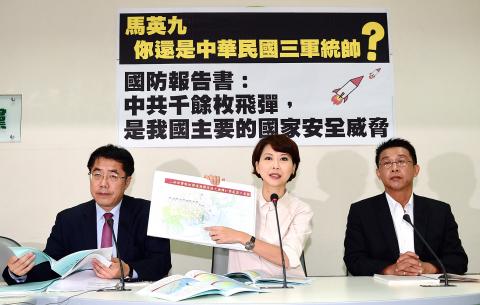Democratic Progressive Party (DPP) presidential candidate Tsai Ing-wen (蔡英文) yesterday panned President Ma Ying-jeou (馬英九) over a statement he made during a meeting with Chinese President Xi Jinping (習近平) that China should remove missiles aimed at Taiwan to appease criticism from the opposition.
Ma has come under fire for failing to elaborate on the so-called “1992 consensus” as meaning that Taiwan and China belong to “one China,” although each side could make its own interpretation of what “China” means, during Saturday’s meeting and he spoke only of the “one China” principle, according to a transcript of Ma’s statements during the closed-door meeting publicized yesterday by the Mainland Affairs Council.
The transcript drew further criticism over Ma’s request that China remove the more than 1,000 missiles aimed at Taiwan, as it was a “basis for opposition criticism.”

Photo: Lo Pei-der, Taipei Times
Ma later said that Xi told him that the missiles are not aimed at Taiwan.
“The president represents the nation and he should not take into consideration partisan politics when dealing with foreign affairs,” Tsai said in response.
“Military issues, especially, should not be simplified as a dispute between the blue and green political camps, as it could involve lives, property and the safety of Taiwanese,” she said.
“The way that the president describes it is very disappointing,” Tsai added.
Asked if she would follow the so-called “1992 consensus” if elected president, Tsai did not directly address the question.
Tsai said that she has made it very clear that the main objective of her cross-strait policy would be maintaining the free and democratic lifestyle of Taiwanese, as well as maintaining peace and stability across the Taiwan Strait.
“All cross-strait exchanges must meet the criteria of ‘equal footing and dignity,’ ‘open and transparent,’ as well as ‘not involving political preconditions,’” Tsai said.
If elected president, Tsai said her responsibility would be defending the right of Taiwanese to have more options instead of limiting people’s right to choose.

Chinese Nationalist Party (KMT) Chairman Eric Chu (朱立倫), spokeswoman Yang Chih-yu (楊智伃) and Legislator Hsieh Lung-chieh (謝龍介) would be summoned by police for questioning for leading an illegal assembly on Thursday evening last week, Minister of the Interior Liu Shyh-fang (劉世芳) said today. The three KMT officials led an assembly outside the Taipei City Prosecutors’ Office, a restricted area where public assembly is not allowed, protesting the questioning of several KMT staff and searches of KMT headquarters and offices in a recall petition forgery case. Chu, Yang and Hsieh are all suspected of contravening the Assembly and Parade Act (集會遊行法) by holding

PRAISE: Japanese visitor Takashi Kubota said the Taiwanese temple architecture images showcased in the AI Art Gallery were the most impressive displays he saw Taiwan does not have an official pavilion at the World Expo in Osaka, Japan, because of its diplomatic predicament, but the government-backed Tech World pavilion is drawing interest with its unique recreations of works by Taiwanese artists. The pavilion features an artificial intelligence (AI)-based art gallery showcasing works of famous Taiwanese artists from the Japanese colonial period using innovative technologies. Among its main simulated displays are Eastern gouache paintings by Chen Chin (陳進), Lin Yu-shan (林玉山) and Kuo Hsueh-hu (郭雪湖), who were the three young Taiwanese painters selected for the East Asian Painting exhibition in 1927. Gouache is a water-based

Taiwan would welcome the return of Honduras as a diplomatic ally if its next president decides to make such a move, Minister of Foreign Affairs Lin Chia-lung (林佳龍) said yesterday. “Of course, we would welcome Honduras if they want to restore diplomatic ties with Taiwan after their elections,” Lin said at a meeting of the legislature’s Foreign Affairs and National Defense Committee, when asked to comment on statements made by two of the three Honduran presidential candidates during the presidential campaign in the Central American country. Taiwan is paying close attention to the region as a whole in the wake of a

OFF-TARGET: More than 30,000 participants were expected to take part in the Games next month, but only 6,550 foreign and 19,400 Taiwanese athletes have registered Taipei city councilors yesterday blasted the organizers of next month’s World Masters Games over sudden timetable and venue changes, which they said have caused thousands of participants to back out of the international sporting event, among other organizational issues. They also cited visa delays and political interference by China as reasons many foreign athletes are requesting refunds for the event, to be held from May 17 to 30. Jointly organized by the Taipei and New Taipei City governments, the games have been rocked by numerous controversies since preparations began in 2020. Taipei City Councilor Lin Yen-feng (林延鳳) said yesterday that new measures by